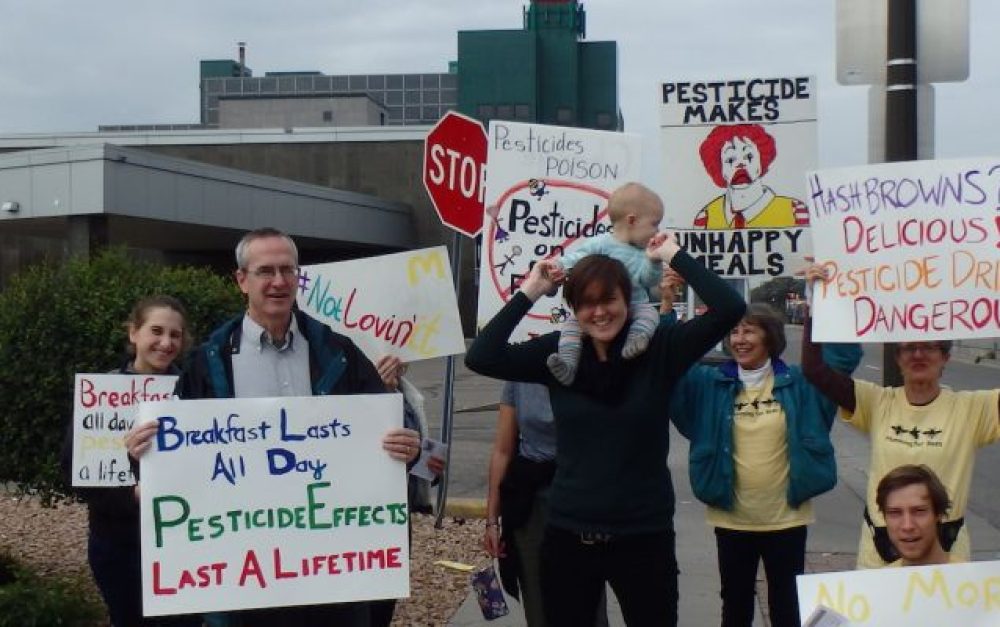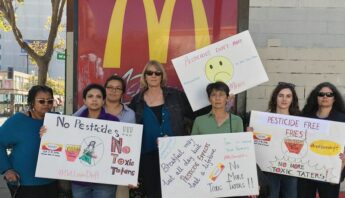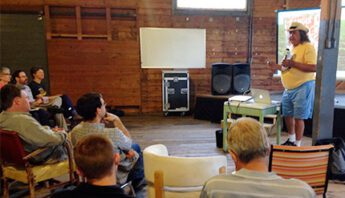FOR IMMEDIATE RELEASE: October 6, 2015
Contact: Lex Horan, Pesticide Action Network, (651) 245-1733, lex@panna.org
Amy Mondloch, Toxic Taters Coalition, (218) 850-3629, tatercoordinator@gmail.com
Toxic Taters meets McDonald’s all-day breakfast with a message: pesticide effects last a lifetime
Communities near potato fields call on McDonald’s to cut pesticide use
Callaway, MN — On October 6th, rural residents, sustainable agriculture advocates, Native organizations, environmental health proponents and students organized actions at McDonald’s stores across the U.S., calling on the fast food giant to cut pesticides in its potato supply chain.
Community groups from southern California to northern Minnesota hosted events at local McDonald’s restaurants on Tuesday, bringing attention to the issue of pesticide drift from potato fields in north central Minnesota. Thousands of activists and consumers joined in, pressing McDonald’s for action with phone calls, emails and on social media.
Rural communities and residents of the White Earth Indian Reservation in north central Minnesota are regularly exposed to hazardous pesticides that harm human health, crops, livestock and wildlife.
“As soon as the potatoes moved in, our lives changed,” said Holly Ward, a member of the Toxic Taters Coalition and a resident of Perham, Minnesota. “Earlier this summer I was working in my garden when I started to feel burning in my nose, eyes, mouth and skin. I looked up and saw a helicopter spraying the field next door, and a yellow-green cloud of pesticide drifting into my yard. There was damage to all of the plants in my garden. My family couldn’t eat the vegetables we’d grown for the rest of the summer.”
Several of Tuesday’s actions took place in Minnesota communities that are surrounded by potato fields, including Perham, Wadena, and Detroit Lakes. At each event, Toxic Taters supporters delivered a letter to the McDonald’s store manager, calling for the fast food giant to work with potato growers to reduce hazardous pesticide use.
“In the communities near the potato fields, the fields and the pesticides are very much a part of people’s lives,” said Lera Hephner, communications specialist with the Toxic Taters Coalition and resident of the White Earth Indian Reservation. “The way the potatoes are grown has a really big impact on the future generations. Children are being affected. It’s because of them that we took action on McDonald’s today.”
The Toxic Taters day of action coincided with McDonald’s launch of its all-day breakfast menu, part of the company’s “turnaround plan” to address falling sales. The plan also includes new commitments to increase sustainability and transparency in the company’s supply chain, including pledges to source cage-free eggs, antibiotic-free chicken and sustainable beef. However, the company has yet to make good on its 2009 promise to reduce pesticides used to grow the potatoes it purchases.
“Hashbrowns all day are delicious,” said Lex Horan, organizer with Pesticide Action Network. “But when McDonald’s customers order world-famous fries or crispy hashbrowns, they should be able to trust that the potatoes they’re eating were grown without hazardous pesticides. No one wants their breakfast to come at the expense of another community’s health and wellbeing.”
The McDonald’s Corporation buys more than 3.4 billion pounds of U.S. potatoes annually, making it the largest potato purchaser in the country — and thus the largest influence on the agricultural practices of our nation’s potato growers. The company has not made any meaningful progress since making its 2009 pesticide use reduction promise. McDonald’s has surveyed its growers about their practices, but has taken no other steps to ensure significant reductions in pesticide use.
Toxic Taters is calling on McDonald’s to make the following changes in its potato supply chain:
Require that its potato suppliers — like RD Offutt company, a major producer in northern Minnesota — achieve measurable and significant decrease in use of health-harming pesticides.
Require its potato producers to release information on the chemicals they apply to their crops.
Fund human and ecological health studies on the regions impacted by potato production.
Ensure that its potato producers adopt environmentally sound, sustainable agriculture practices.
For a full list of Tuesday’s actions, see toxictaters.org/take_action_on_mcdonalds. Photos from actions will be added throughout the day at toxictaters.org/photos.
###







